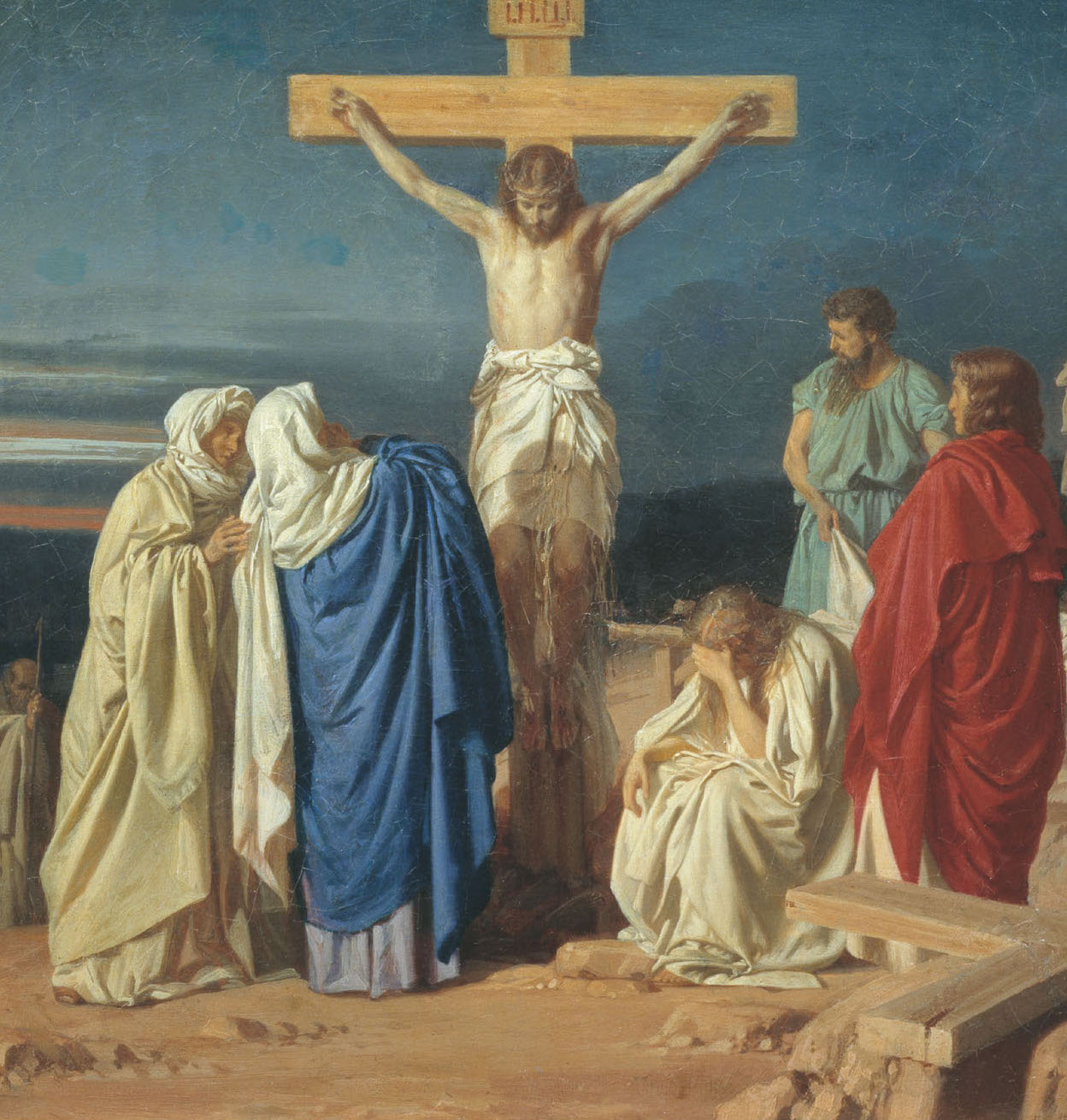This firstSaturday of November falls on All Saints’ Day. And the first saint is called Dysmas, the good thief, canonized on the cross by Our Lord Himself. So today we will meditate on the fifth sorrowful mystery, the Crucifixion. How can we understand this unfathomable mystery in which Jesus’ infinite Love is mixed with so much suffering? We need guidance, and it is Christ Himself who will give it to us. On His Cross, in the midst of three hours of agonizing silence, He uttered only seven words. The first three express His love for us, the next two His suffering, and the last two His abandonment to His Father’s will. Like the Our Father, which contains seven prayers, these seven words of Christ on the Cross are a splendid teaching that sums up His mission as Redeemer.

1/ “Father, forgive them, for they know not what they do! (Lk 23:34)”
After teaching us forgiveness in the Lord’s Prayer, Jesus himself puts it into practice and gives us a sublime example. Let us immerse ourselves in this forgiveness of the Cross. He is in agony, suffering excruciating pain, insulted, humiliated, paralyzed by the nails in his flesh, crowned with thorns. At the same time, he sees his Mother’s Heart pierced with sorrow. And in the face of this, He expresses no resentment. His first words are words of forgiveness… a masterful example for us. So, whenever we ourselves find it difficult to forgive, let us return to this Cross and make the words of our divine Master our own.
2/ “Truly I tell you, today you will be with me in paradise (Lk 23:43).”
The passage of the good thief is a demonstration of this forgiveness. It is also a lesson that shows us the conditions for obtaining this forgiveness. For contrary to a common misconception, God’s mercy is not automatic. Otherwise, hell—which the Blessed Virgin showed to the children of Fatima—would not exist, and we would all go to Heaven. God wants to offer His mercy to all men, yes, but obtaining it depends on us. To be forgiven, we must, like the good thief, sincerely regret our sins. St. Alphonsus Liguori sums up his attitude: “He believed, he repented, he proclaimed, he loved…” The bad thief, on the other hand, does not regret his sins, and in the face of this free refusal, Jesus can do nothing. But the sincere repentance and faith of the good thief will bring in return a flood of Love from the Heart of Jesus. Let us note how quickly Christ grants him His Mercy from the moment he repents! Dysmas, the brigand, is canonized on the spot by God Himself! What hope for us poor sinners if we follow the example of Saint Dysmas and ask Jesus for forgiveness with the same simplicity and sincerity!
3/ “Woman, behold your son. Son, behold your Mother (Jn 19:26-27).”
Christ’s third act of love required another “Fiat” from the Blessed Virgin. To understand this properly, let us listen to St. Bernard: “These two great martyrs, Jesus and Mary, suffered in silence: the excess of pain that oppressed them took away their ability to speak. The Mother looked at her Son dying on the cross, the Son looked at his Mother dying at the foot of the cross and dying of compassion for the pains he was enduring.” And suddenly, while Mary’s heart is completely filled with sorrow and love for her only Son, Jesus suddenly asks her to make room in her pierced heart to also become the Mother of men—those men, some of whom are in the process of killing her Son! How could she not have been offended by these words? How, in her inexpressible pain, could she not have at least whispered to Jesus that she had only one Son? None of this happened. As at the Annunciation, she followed God’s will in total obedience and welcomed us into her wonderful Heart from that moment on. As for Jesus, what self-sacrifice! He gives us the person He loves most after His Father and the Holy Spirit: His own Mother. He gives Her to us, who are so unworthy of Her and who cause Her so much suffering. The unfathomable mystery of Jesus’ love.
4/ “My God, my God, why have you forsaken me? (Mt 27:46)”
After expressing his love for us, Jesus twice expresses his pain. At first glance, this fourth word on the cross seems strange, coming from Him who is God. This cruel abandonment, which elicits this cry from Him, is in fact necessary for divine justice. Jesus must indeed endure the bitterness of abandonment Himself in order to atone for the abandonment of men towards God. Even today, do we not abandon Him so often? Through our sins, but also by spending our days without praying, without thinking of Him, without going to see Him in the tabernacle… Through His fourth word on the Cross, Jesus also wants to show us how much He suffered as a man. ” ” One might have thought that, Jesus Christ being both man and God, His divinity would have prevented the torments from causing Him pain; to dispel this suspicion, He wanted to testify by this plaintive cry that His death was the most painful that any man had ever endured, and that, while the Martyrs were sustained in their torments by divine consolations, He, as King of Martyrs, wanted to die deprived of all relief, and to satisfy divine Justice in all its rigor for all the sins of men,” explained Saint Alphonsus Liguori. In his Passion, Jesus the Man did not benefit from the assistance of Jesus the God.
5/ “I thirst! (Jn 19:28)”
Jesus expresses here an extreme physical thirst due to the loss of all his blood and the torment of crucifixion, known to cause such suffering. But He suffered so many other torments: the nails, the crown of thorns, His skin torn off… Why did He choose to express this one? Because beyond the physical aspect, these words express a profound mystical reality that connects with the suffering of abandonment: Jesus cries out His thirst for the love of mankind. These words foreshadow the apparitions at Paray-Le-Monial, where Our Lord will institute the devotion to the Sacred Heart to show us His infinite Love through His Heart of flesh, while confiding in us His sadness at receiving only “ingratitude” in return. This thirst for our love for Him is still there. Jesus is with us on earth until the end of the world. At every Mass, during the consecration, He renews His sacrifice on the cross—in a real but bloodless way. Each time, He truly expresses His thirst for love. Faced with this, what do we do? Do we truly love Him in the depths of our hearts, or do we give Him vinegar through our indifference or irreverence? So at every Mass—and especially during Communion—let us close our eyes and listen to Jesus crucified saying to us: “I thirst for your love.” Our Communion will never be the same again, and our hearts will be transformed.
6/ “It is finished! (Jn 19:30)”
This sixth word of Jesus finds its prefiguration in the miracle at Cana. The servants poured water into the jars to the brim, a sign of total obedience to Christ’s request. This obedience brought about the first miracle of Jesus’ public life. With these words on the Cross, Jesus announced that He too had accomplished His work to the end. He did his Father’s will in total perfection, even to the point of death on the Cross. Just as the obedience of the servants made the miracle at Cana possible, so Jesus’ obedience made possible the great miracle of Redemption. Just as water was turned into wine, so man, separated from God, was transformed into a child of God.
7/ “My Father, into your hands I commend my spirit (Lk 23:46).”
Jesus is now about to undergo the ultimate trial of every human being: death. But He does not suffer this death because He has never sinned and is more powerful than death itself. Through these words, He shows that He is the master of life. He should have died long before the Cross, for the tortures He endured would have been enough to kill an ordinary man. But it is He who chooses His hour. By uttering this final cry, Jesus entrusts not only His soul to the Father, but also ours. Such is the sublime charity of our Master and Lord. St. Athanasius explains that “Jesus Christ, in commending himself to his Father, likewise commended all the faithful, who were to receive eternal salvation through him, because the head and the members form one body.” We must say these last words of Jesus Crucified at the end of our lives. Let us imagine: in one minute we are going to die. Everything is over here below and we are leaving this world. Let us close our eyes and say again: My Father! I commend my soul into your hands. Then, inevitably, the question will arise: but what is the state of the soul that I am going to give to the Father? In this final moment, Satan will try to make us believe, as he did with Judas, that God’s forgiveness is impossible. And that is when we must follow the example of the good thief: humbly acknowledge our sins, ask Jesus for forgiveness, and entrust ourselves to His infinite mercy.
Author: Alliance “1st Saturdays of the Month”




